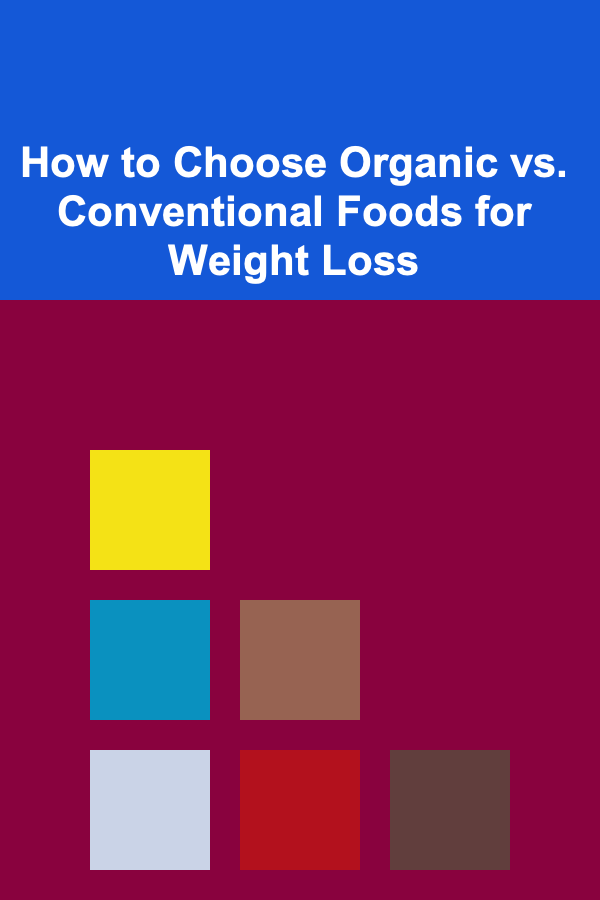
How to Choose Organic vs. Conventional Foods for Weight Loss
ebook include PDF & Audio bundle (Micro Guide)
$12.99$7.99
Limited Time Offer! Order within the next:

When it comes to losing weight, the importance of a balanced diet and physical activity is often emphasized. However, an essential factor that often goes under the radar is the quality of the food we consume. Many people find themselves asking whether they should choose organic or conventional foods, particularly when trying to lose weight. The decision between organic and conventional foods can be complex and personal, influenced by factors such as price, availability, nutritional content, environmental concerns, and perceived health benefits. This article explores how to make the right choices between organic and conventional foods in the context of weight loss and provides evidence-based insights to help individuals make informed decisions.
What Are Organic and Conventional Foods?
Before delving into the debate on organic vs. conventional foods for weight loss, it's important to first understand the distinction between these two categories of food:
Organic Foods
Organic foods are grown and processed without the use of synthetic pesticides, herbicides, or fertilizers. They are also free from genetically modified organisms (GMOs), irradiation, and antibiotics in the case of animal products. Organic farming practices prioritize sustainability, soil health, and biodiversity. For food to be certified organic, it must meet strict guidelines set by a recognized certifying organization, such as the USDA Organic label in the United States or the EU Organic logo in Europe.
Conventional Foods
Conventional foods, on the other hand, are grown using traditional farming methods that may include the use of synthetic chemicals (pesticides, herbicides, and fertilizers) and GMOs. These foods are not bound by the same rigorous standards as organic foods, and the farming practices may vary depending on the location and the type of crop. Conventional foods tend to be more widely available and generally less expensive than their organic counterparts due to the methods used in their production and distribution.
Nutritional Differences: Organic vs. Conventional Foods
One of the key arguments in favor of choosing organic foods is the belief that they are nutritionally superior to conventional foods. Several studies have sought to compare the nutritional content of organic and conventional foods, with mixed results. While the difference in nutritional content between the two is not always dramatic, there are a few key points to consider:
1. Higher Levels of Antioxidants
Organic foods, particularly fruits and vegetables, are often reported to contain higher levels of antioxidants than conventional foods. Antioxidants, such as vitamins C and E, flavonoids, and polyphenols, are compounds that help protect the body against oxidative stress and inflammation, both of which are linked to chronic diseases like heart disease, diabetes, and cancer. Some studies suggest that organic produce may have up to 20-40% higher antioxidant levels than conventionally grown produce. This could be due to the fact that organic plants produce more antioxidants as a natural defense against pests and environmental stressors.
2. Lower Pesticide Residues
One of the most significant concerns when it comes to conventional foods is the potential presence of pesticide residues. Conventional farming often relies on chemical pesticides to protect crops from pests and diseases. While the pesticides used in conventional farming are generally deemed safe for human consumption by regulatory agencies, some people may be concerned about the cumulative effects of long-term pesticide exposure. Organic foods are grown without synthetic pesticides, which may make them a safer choice for individuals who are cautious about pesticide residues.
3. Possible Differences in Macronutrient Content
While studies on the macronutrient content (such as protein, fat, and carbohydrates) of organic vs. conventional foods have shown no major differences, some research suggests that organic foods may have slightly higher levels of omega-3 fatty acids, especially in organic dairy products and meat. Omega-3 fatty acids are essential for heart health, weight regulation, and inflammation reduction. Therefore, if you're aiming for a balanced diet that supports weight loss, organic sources of omega-3s might be beneficial.
4. Soil Health and Nutrient Density
The farming methods used in organic agriculture focus on improving soil health through crop rotation, composting, and the use of natural fertilizers. Healthier soil tends to produce nutrient-dense crops, which means that organic foods may offer more vitamins and minerals compared to conventional ones. However, while some studies suggest organic foods may have marginally higher nutrient content, the overall differences are often not large enough to dramatically impact weight loss.
The Role of Hormones and Antibiotics in Animal Products
Animal products like meat, dairy, and eggs also play a significant role in the organic vs. conventional debate. Conventional farming practices often involve the use of growth hormones and antibiotics to increase the size of livestock and prevent diseases. While these substances are generally considered safe in the quantities used, some individuals may be concerned about the long-term effects of consuming products from animals treated with hormones or antibiotics.
Organic Animal Products
Organic meat and dairy products are raised without the use of synthetic hormones or antibiotics. Some studies suggest that organic animal products may have a slightly higher nutritional value, particularly in terms of omega-3 fatty acids, when compared to conventional animal products. Additionally, organic farming practices often result in better living conditions for the animals, which may appeal to individuals who are concerned about animal welfare.
Weight Loss and Hormonal Disruption
One aspect of the organic vs. conventional food debate that has gained increasing attention in recent years is the potential impact of food on hormone regulation. Conventional farming methods often rely on chemicals, pesticides, and growth hormones that may disrupt hormonal balance in the body.
Endocrine Disruptors in Conventional Foods
Endocrine disruptors are chemicals that can interfere with the hormonal system, potentially leading to weight gain, metabolic dysfunction, and an increased risk of obesity. Some pesticides and herbicides used in conventional farming are believed to be endocrine disruptors. For example, studies have shown that chemicals like atrazine, which is commonly used on conventional crops, can interfere with hormone signaling in both humans and animals. While the evidence linking endocrine disruptors to weight gain is still being studied, it's plausible that minimizing exposure to these chemicals could help support a balanced hormonal environment, which is crucial for weight loss and overall health.
Organic Foods and Hormonal Health
By choosing organic foods, you reduce exposure to synthetic chemicals that may disrupt hormone function. This is particularly important for individuals who are sensitive to hormonal imbalances or those who are working to optimize their weight loss efforts.
Cost Considerations
One of the most significant barriers to choosing organic foods is cost. Organic foods are typically more expensive than conventional foods due to the more labor-intensive farming practices, lower crop yields, and the certification process. However, the price difference may be less noticeable when it comes to staple foods like grains, which are available in both organic and conventional forms.
Organic vs. Conventional: Is It Worth the Price for Weight Loss?
When it comes to weight loss, the primary factors that influence success are the overall quality and quantity of food consumed, rather than whether it's organic or conventional. While organic foods may offer slight nutritional benefits, such as higher antioxidant levels or reduced pesticide exposure, conventional foods can still be a healthy part of a balanced diet. If the higher cost of organic foods is prohibitive, it's better to focus on purchasing fresh, minimally processed foods, regardless of whether they are organic or conventional.
The Dirty Dozen and Clean Fifteen
For individuals who are concerned about pesticide exposure but want to stick to a budget, the Environmental Working Group (EWG) provides a helpful guide called the "Dirty Dozen" and "Clean Fifteen." The Dirty Dozen is a list of fruits and vegetables that tend to have the highest pesticide residues when grown conventionally, making them ideal candidates for purchasing organic. Conversely, the Clean Fifteen are items with the lowest pesticide residues, which may be acceptable to buy in their conventional form.
Environmental Impact of Organic vs. Conventional Farming
The environmental impact of organic vs. conventional farming is another factor that can influence food choices, particularly for individuals who are concerned about sustainability and the long-term health of the planet.
Organic Farming and Sustainability
Organic farming methods tend to be more sustainable because they prioritize soil health, water conservation, and biodiversity. Additionally, organic farms often use fewer chemical pesticides, which can have harmful effects on surrounding ecosystems. Organic practices also reduce the risk of water contamination from pesticide runoff and help promote a healthier, more resilient agricultural system.
Conventional Farming and Environmental Cost
Conventional farming practices are generally more resource-intensive, often relying on synthetic pesticides and fertilizers that can harm the environment. While conventional farming methods may produce larger yields and lower food prices, they may also contribute to soil depletion, water contamination, and loss of biodiversity. For individuals who are concerned about the environmental impact of their food choices, choosing organic options when possible may be a way to support more sustainable agricultural practices.
Conclusion
Choosing between organic and conventional foods for weight loss is a personal decision that depends on a variety of factors, including nutritional considerations, price, environmental concerns, and individual health needs. While organic foods may offer benefits in terms of lower pesticide exposure, higher antioxidant levels, and improved hormonal balance, conventional foods can still be part of a healthy, weight-loss-friendly diet. Ultimately, the most important thing is to focus on a balanced, whole-foods-based diet that supports your weight loss goals, regardless of whether the food is organic or conventional.
In the end, whether you choose organic or conventional foods, the key to successful weight loss lies in making mindful, informed choices that work for your unique needs and preferences. A diet rich in fruits, vegetables, lean proteins, whole grains, and healthy fats---whether organic or conventional---combined with regular physical activity, will put you on the right path toward achieving your weight loss goals.

How to Celebrate Milestones in Your Music Journey Through Organization
Read More
How to Handle Security Concerns for Multi-Story Homes
Read More
How to Invest in Bonds and Fixed-Income Securities for Stability
Read More
How to Make Your Bed a Space-Saving Solution
Read More
How to Offer Specialized Cleaning Services (e.g., Carpet, Upholstery)
Read More
How to Soundproof a Noisy Neighbor's Apartment
Read MoreOther Products

How to Celebrate Milestones in Your Music Journey Through Organization
Read More
How to Handle Security Concerns for Multi-Story Homes
Read More
How to Invest in Bonds and Fixed-Income Securities for Stability
Read More
How to Make Your Bed a Space-Saving Solution
Read More
How to Offer Specialized Cleaning Services (e.g., Carpet, Upholstery)
Read More